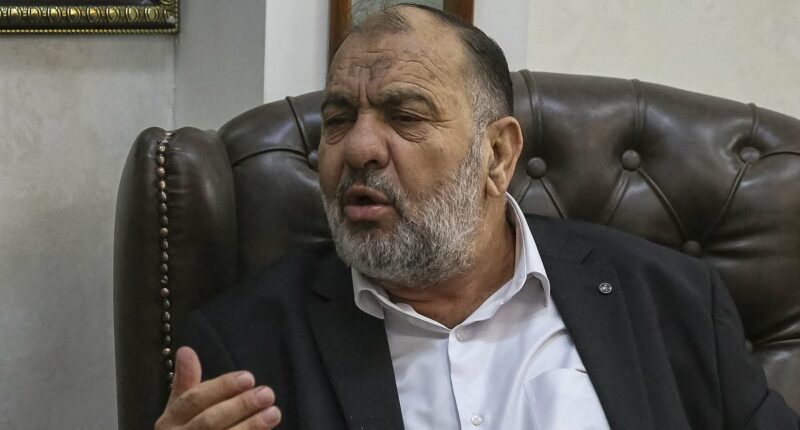Share this @internewscast.com
An English council has defended its decision to hold talks with a Palestinian politician over plans to establish a ‘twin town’ agreement after it emerged that he was a convicted terrorist.
Preston City Council is pursuing a bid to twin itself with the city of Hebron in the occupied West Bank in a ‘friendship agreement’ that would symbolise its support for ‘the people of Palestine’ and those ‘suffering through conflict across the globe’.
But the Labour-run authority has been met with anger from Jewish groups after it emerged that it would invite Tayseer Abu Sneineh, the mayor of Hebron, to address the working group behind the project.
Abu Sneineh was one of four Palestinian militants who attacked a group of Jews in an alley in Hebron on May 2 1980, killing six – three Israelis, two Americans and one Canadian – and injuring 20 others.
All had been returning home from Sabbath prayer services when they were attacked, and five of the six dead were young people aged between 20 and 21.
The mayor has insisted that the people he attacked were armed – and were illegally occupying the city, which has since been mostly returned to Palestinian control.
He was sentenced to life in prison but freed in a prisoner exchange between Israel and the Palestine Liberation Organisation. He was then elected mayor of Hebron in 2017 on a Fatah ticket.
Preston City Council says it has invited the Mayor to speak at an online meeting of the group behind the twinning arrangement – and has refused to back down.

Hebron’s mayor Tayseer Abu Sneineh has been invited to speak at a meeting that will see the town ‘twinned’ with the city of Preston

Abu Sneineh is mayor of Hebron, which is occupied by Israel but remains largely under Palestinian administrative control (pictured: Israeli forces checking IDs of Palestinian locals)

Matthew Brown, the Labour leader of Preston City Council (pictured with Jeremy Vine) has stood firm on the city’s decision to invite Abu Sneineh to speak in an online meeting
The Jewish Representative Council of Greater Manchester and Region (JRC) said it was ‘beyond comprehension’ that the council would seek to invite a convicted terrorist to speak.
‘He has never shown remorse for his crimes and continues to promote extremist rhetoric,’ the organisation said in a letter to council chief executive Adrian Phillips.
‘By extending this invitation, the Council has displayed appalling judgement that risks bringing Preston into disrepute. The decision will be seen as an insult to victims of terrorism and an affront to democracy.
‘We call on the Council to urgently revisit this decision and rescind the invitation. Anything less would be a grave dereliction of duty.’
But Preston City Council, which voted by majority to enter into the friendship agreement with the West Bank city in June, is standing firm – citing the fact that the city of Derby already has its own agreement in place with Hebron.
It says it does not hold Abu Sneineh’s views, and that it wants to show support for ‘a viable State of Palestine coexisting alongside the State of Israel’ with ‘safety, security and prosperity for both countries’.
In a statement, Labour leader Matthew Brown said: ‘We are pursuing the friendship with Hebron in the spirit of peace and community and in support of the people of that city and the wider region.
‘In doing so, we do not endorse any individual and continue to condemn intolerance and violence of any kind.
‘We are informed that 40 places across the world have a relationship with Hebron, including Spain, France, UK, Italy and Greece.’

Abu Sneineh (standing) has served as Mayor of Hebron since 2017. The city is under 80 per cent Palestine control

Israel has been accused of breaching international law with its activities in Hebron (pictured: Israeli security forces block a road after settlers allegedly stopped Palestinians from accessing their land on the outskirts of Hebron)

A Palestinian man inspects his grape vines after they were cut down by Israeli settlers earlier this month
The agreement will see Preston and Hebron work together to share knowledge of their culture and traditions, promote cultural exchanges and youth programmes, and to share best practices in local government. It has no expiry date.
Mr Brown added that it consulted with its Faith Covenant group, which counts Muslims, Hindus, Christians and Jews among its number, and invited them to join the steering group for the friendship agreement.
He added: ‘We have no intelligence to suggest that there is a direct threat posed by any party in this friendship, which is being pursued in the spirit of friendship and tolerance.’
In a written response to the JRC, the council leader noted that a ‘significant majority’ of councillors voted in favour of the friendship deal, and that the authority was ‘clear in its condemnation’ of Hamas’ actions on October 7, which saw 1,200 Israelis killed.
‘The Council does not endorse the views of the political leadership in Hebron, or for that matter any other place where the city has twinning or friendship arrangements,’ he added.
The council began looking for a Palestinian settlement to link up with in early 2024 in response to pleas from the city’s mosques following the breakout of war in Gaza after the October 7 attacks.
It says it is committed to exploring a similar friendship with an Israeli town or city, subject to finding an organisation that can help guide it. The Hebron twinning has been facilitated by the Britain Palestinian Friendship and Twinning Network.
‘The point of friendship is to create lasting relationships in order to avoid hate and division,’ it said in the statement agreed by elected members in June.
But Daniel Guise, a Liberal Democrat councillor, accused the authority of making little effort to find an Israeli town with which to strike a similar agreement.
He said in June in remarks reported by the Lancashire Telegraph: ‘You’ve had 10 months… you didn’t do it because you didn’t want to.’

The cover page of the friendship agreement between Preston and Hebron in the Israel-occupied West Bank

The agreement will see Preston and Hebron work together to share knowledge of their culture and traditions (pictured: a high street in Preston)

An armed Israeli settler stands in a street behind two Israeli troops in the middle of Hebron, pictured August 23

Tayseer Abu Sneineh, pictured in July, has claimed that the people he targeted in 1980 were armed
And Stephen Thomson, leader of Preston’s Conservative group, told the Local Democracy Reporting Service it was ‘appalling that Preston Labour have allowed themselves to be bullied into the friendship agreement with Hebron’.
He added: ‘The Mayor of Hebron is the last person Preston needs should there be a civic visit from Hebron. The Jewish people in Preston have had enough and I stand by them.’
Located 19 miles south of Jerusalem, Hebron was occupied by Israel after the Six-Day War in 1967.
However, the 1997 Hebron Protocol saw 80 per cent of the city put under Palestinian control, with Israel controlling the remaining fifth.
Israeli troops continue to maintain a highly visible presence at the borders of the areas they control, and has been accused of breaching international law.
In his tenure as Mayor, Abu Sneineh has also courted controversy after offering a bounty of 20 shekels (around £4.40) for killing stray dogs. He later backtracked and claimed he had been joking.
He was reported in 2017 to have insisted that his terrorism days are behind him – but has not been reported to have expressed remorse for his actions.
Abu Sneineh told the Associated Press then of the people he attacked: ‘They all were armed settlers and soldiers, no women or children. We attacked them with guns and hand grenades.
‘We wanted to send a message to the settlers that this is our city and they have to leave.’
He added that while he was committed to peace with Israel, ‘the Palestinians will have the right to return to armed struggle’ if there is no Palestinian state.
‘They are occupiers,’ Abu Sneineh said of the Israelis who had settled in the West Bank.
‘They occupy our homes by force. They killed many people in the city in cold blood, and one day they have to leave.’
The Daily Mail has contacted Preston City Council and Abu Sneineh’s office for further comment.







